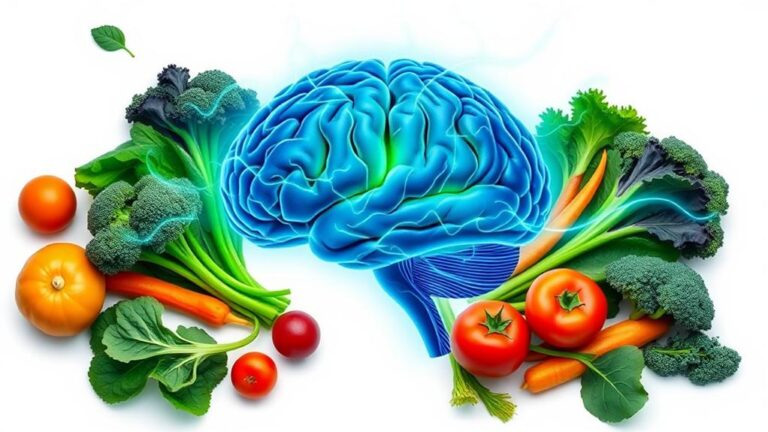Imagine waking up each morning with consistent energy levels, like Sarah, who swapped her high-carb breakfast for a protein-packed alternative. She found herself powering through her day without the usual mid-afternoon slump. This shift not only altered her physical stamina but also improved her mental clarity. What if this simple dietary change could redefine how you approach your daily activities? Exploring the nuances of low carb diets might just reveal the key to sustained energy and focus that many are still searching for.
Understanding Low Carb Diets
Low carb diets, often touted for their weight loss benefits, focus on reducing carbohydrate intake while emphasizing proteins and healthy fats. By cutting back on carbs, you're encouraging your body to enter a metabolic state called ketosis, where it burns fat for fuel instead of relying on glucose. This shift can lead to significant weight loss and improved energy levels.
Typical carb intake on a low carb or keto diet ranges from 20 to 50 grams per day, with individuals monitoring their net carbs to stay within these limits.
When you adopt a low carb diet, you'll typically reduce your intake of foods like bread, pasta, and sugary snacks. Instead, you'll fill your plate with lean meats, fish, eggs, and plenty of non-starchy vegetables. You'll also enjoy healthy fats from sources such as avocados, nuts, and olive oil, which can help keep you satiated and energized.
One of the key aspects of a successful low carb diet is finding the right balance. It's crucial to tailor your carb intake to your individual needs and activity level.
While some people thrive on ultra-low carb plans, others might find moderate reductions more sustainable. As you navigate this dietary approach, listen to your body and adjust as necessary to guarantee you feel your best.
Impact on Blood Sugar Levels
Managing blood sugar levels is one of the significant benefits of adopting a low carb diet. When you reduce your carbohydrate intake, your body relies less on glucose for energy, which helps stabilize your blood sugar. This can be particularly beneficial if you struggle with insulin resistance or type 2 diabetes. By minimizing carbs, you're effectively lowering the spikes and crashes associated with high sugar intake.
Ketogenic diets, which are extremely low in carbs, can be especially effective for blood sugar management and have gained popularity for their potential health benefits.
With fewer carbs, your body produces less insulin, leading to more balanced blood sugar levels. You may notice that you feel more energized throughout the day without the rollercoaster effects of fluctuating sugar levels. It's easier to maintain focus and avoid mood swings that often accompany high-carb meals.
Additionally, a low carb diet encourages you to incorporate more whole foods like vegetables, nuts, and lean proteins, which can further support your blood sugar management. These foods often have a lower glycemic index, meaning they won't cause rapid increases in blood sugar.
Enhanced Fat Burning Mechanism
One of the most compelling aspects of a low carb diet is its ability to enhance fat burning. When you reduce carbohydrate intake, your body shifts from relying on glucose for energy to burning fat instead. This metabolic switch can lead to more efficient fat utilization, allowing you to tap into your body's stored fat reserves.
Nutritional ketosis is achieved when carbohydrates are restricted to typically under 50 grams per day, promoting ideal fat burning.
As you lower carbs, insulin levels drop, which is essential for fat burning. Insulin is a hormone that promotes fat storage; with lower insulin levels, your body becomes more capable of accessing fat stores for energy. This process not only helps in weight loss but also improves your overall energy levels.
Additionally, as your body adapts to this new fuel source, you might notice that it becomes more efficient at burning fat even during exercise. You'll likely find that you can sustain longer workouts without hitting the dreaded wall that often comes from carb-heavy diets.
Incorporating healthy fats, like avocados and nuts, further supports this fat-burning mechanism, providing you with energy and keeping you satiated.
With this shift in energy sources, you'll feel empowered to reach your fitness goals while enjoying the benefits of a low carb lifestyle.
Mental Clarity and Focus
Shifting to a low carb diet can really boost your mental clarity and focus. When you lower your carb intake, your body starts using fat as its primary fuel source, which can lead to improved cognitive function. This change helps you eliminate the brain fog often linked to high sugar consumption, allowing you to think more clearly and stay engaged.
You might notice that your attention span increases and distractions become easier to manage. Instead of riding the rollercoaster of energy spikes and crashes from sugary snacks, you'll experience a steadier flow of mental energy. This stability translates into sharper focus during tasks, whether you're working on a project or studying for an exam.
As your body adapts to this new fuel source, you may even find that you can tackle complex problems with enhanced creativity and critical thinking. A low carb diet can also help regulate mood swings, which contributes to a more consistent mental state.
Sustainable Energy Throughout the Day
With improved mental clarity and focus comes a notable shift in how you experience energy throughout the day.
You'll notice that instead of the usual peaks and valleys, your energy levels become more stable and consistent. This alteration is essential when you're following a low carb diet. By reducing sugar and processed carbs, you're less likely to experience the dreaded crash that often follows a high-carb meal.
Instead of relying on quick sugar fixes, your body learns to tap into fat stores for energy. This change fosters a sense of sustained energy that supports both physical and mental activities. You'll find that you can power through your tasks without the constant urge to snack or the afternoon slump that many face.
To maximize this sustainable energy, focus on incorporating healthy fats and proteins into your meals. Foods like avocados, nuts, and lean meats can help keep you satisfied and energized.
Additionally, staying hydrated is key; even mild dehydration can sap your energy. By making these adjustments, you'll harness a steady stream of energy that enhances your overall productivity and well-being throughout the day.
Conclusion
In a world where sugar crashes leave you drained, low carb diets offer a rejuvenating alternative that energizes instead of exhausts. By embracing healthy fats and proteins, you'll find your energy levels stable and your focus sharp. No longer will you ride the rollercoaster of highs and lows; instead, you'll experience a smooth, sustainable flow of energy throughout the day. Choose to fuel your body wisely, and watch as your productivity soars beyond what you thought possible.



